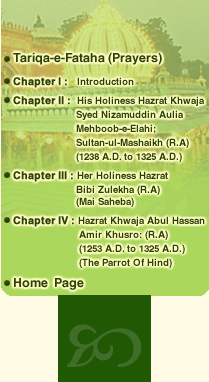 |
|
Dargah
Shareif of Hazrat Amir Khusro (R.A.)
|
1) Life
History
Hazrat Amir Khusro was a great Sufi,
a wealthy merchant who once exchanged all his wealth for
a pair of His Holiness Sultan-ul-Mashaikh shoes, an intellectual
gaint of many languages, an artist, a prolific author, a
genius musician who invented the ‘sitar’, a versatile composer
and a true devoted "mureed" of His Holiness. He was "All-in-One"
type of highly amazing mixture of Divine gifts.
Hazrat Amir Khusro (R.A) was the son
of Amir Alachin a Turk from Laccheen. His actual name was
Saifuddin Mahmood Shamsi. At the invasion of Gengiz Khan
he migrated from his native place Kesh near Samarkand to
Balkh. Saifuddin was the chieftan of Hazara. Shamsuddin
Iltamish the King of Delhi welcomed them to his capital.
He provided shelter to the dislodged princes artisans, scholars
and rich nobles. Saifuddin was among them. It was around
626/ 360 A.H/1226 A.D. In 1230 A.D he was granted afief
in the district of Patiali (in Etah District-Uttar Pradesh).
He married to BiBi Daulat Naz, who bore him three sons and
one daughter. Yaminuddin (Khusro) was one among them born
at Patiali, presently known as Hazrat Amir Khusro Nagar
in District Etah (U.P.) in the year 652-653 A.H/1252-53
A.D. Yaminuddin’s (Khusro) father Saifuddin was mostly engaged
in battles, and was killed in 660 A.H/1260 A.D. Yaminuddin
or Khusro was an intelligent child. Poetry came to him at
the early age of eight.
Later, Khusro reflects on his father’s
bravery as:
"My father Saifuddin Mahmood Shamsi, the
renowned breaker of enemies ranks, possessed might, enough
to conquer the world with all the merits of his inner self,
he never spoke about his inherent goodness and behaved like
an Angel. He was a military commander and a saint. Although
he was highly educated and cultured. He loved martyrdom
from the beginning and he drank ultimately the Sharbate-Shahadat."





